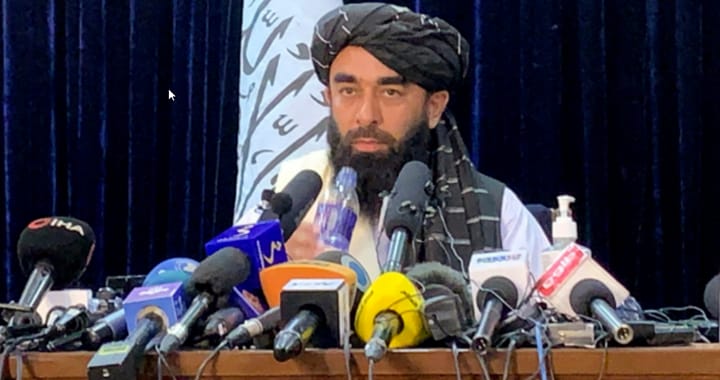In a recent article, well-known Pakistani author Syed Irfan Ashraf drew the attention of the international community toward the Afghan Taliban's treatment of dissidents, journalists, and women. The Islamic Emirate of Afghanistan (the Afghan Taliban jihadi organization) seized power on August 15, 2021, and is yet to be recognized by the international community.
Syed Irfan Ashraf, who is the author of the Dark Side of News Fixing: The Culture and Political Economy of Global Media in Pakistan and Afghanistan, observed: "What the Taliban need is a step in the right direction: developing the capacity to transform their militancy into political rule. Instead of looking outside the country for recognition... the Taliban leadership must respect the history and rights of the Afghans."

The Taliban severely lashed Taqi Daryabi (left) and journalist Neamat Naqdi.
Following are excerpts from the article:[1]
"In Gestapo-Style Raids [By Afghan Taliban], Dissidents Are Regularly Targeted; Reporters Are Beaten Black And Blue; Women Are Being Assaulted For Demanding Their Rights And A Few Continue To Remain Missing"
"Despite eight months in power, the Taliban seem clueless about what kind of political space they want to create in Afghanistan. A key factor contributing to this conundrum is the Taliban style of rule: but, without any valid reference in history, this rule can only be assessed through the group's actions and their consequences. In this context, the Taliban's unimpeachable orthodoxy, which has no room for freedom of expression, offers little hope.
"A brief overview of press freedoms under the Taliban can help understand what Afghanistan has become under the new regime. Six Afghan journalists lost their lives within the first 100 days of the Taliban regime. Over 300 media outlets have reportedly closed so far. Calling radio stations 'the loudspeakers of America,' Taliban foot soldiers burnt down many in the country's southern parts. Over 7,000 media workers fled the country. All this, and the rulers did not seem at all bothered by it.

Zabihullah Mujahid, the Taliban spokesman, addresses a press conference
"'Around 200 to 300 died every day under the previous Kabul administration,' Sohail Shaheen, the Taliban spokesman, said recently during an interview to a Pakistani TV host. 'The situation has changed,' he maintained nonchalantly. However, as most of these deaths took place in Taliban attacks against the previous government, the dystopian nature of the new regime cannot hide itself behind the term 'change.'
"While the Pakistani media provided the Taliban a face saving, Afghan journalists did their bit to question the legitimacy of the orthodoxy. After assuming power, the Taliban central spokesman, Zabiullah Mujahid, arranged a conference in Kabul in which he announced a general amnesty for all Afghans. An Afghan reporter took the spokesman by surprise: 'Do you think the Afghans will forgive you too?' It was a chilling moment for journalists present in the high-profile event. 'It happens in war,' the spokesman simply replied.
"Yet, the war is still on. In Gestapo-style raids, dissidents are regularly targeted. Reporters are beaten black and blue. Women are being assaulted for demanding their rights and a few continue to remain missing. As local journalists cannot freely raise their voice against these abuses, the only option available to them is to network with the Afghan diaspora online. But sharing information about Taliban atrocities also exposes them to strict surveillance. Consequently, over 500 Afghan journalists have fled Kabul in the last five months. Currently living in neighboring states, many of them are running from pillar to post to seek asylum in safer Western countries."
"Soaked In Fear And Terror, Afghanistan Cannot Be Ruled Like A Jihadi Madrassa – A Weaponized Space With No Room For Political And Cultural Rights"
"I talked to a few of these journalists who told me about their painful evacuation. After sending desperate SOSs to rights organizations, some of them received phone calls. 'I did not initially share my details,' said a journalist who went through a lot of trouble before getting a second chance. Depressed and living in unfriendly conditions in a neighboring country, these displaced journalists are afraid of the Taliban coming after them.
"The situation in Ukraine has diverted attention from their plight. However, these reporters are not willing to stop their struggle no matter where they go to live, and the swelling ranks of exiled Afghan journalists is going to be a serious challenge for the Taliban rule.

Syed Irfan Ashraf, author of the article (image courtesy: Dawn.com)
"Meanwhile, guess who has replaced these journalists back home? 'Parachute reporters' – journalists dropped in from the outside with no knowledge of local culture and history. In a country where the rule of law has yet to be defined, power politics prevail over public interests. Access and mobility, therefore, are privileges only a few can avail. Clarissa Ward, a celebrity CNN journalist, invited the wrath of the Afghan diaspora after she donned an abaya [full-body covering] for interviewing the Taliban. For some Afghans, the abaya is not just a dress; its historical association with the Taliban orthodoxy has turned it into a sign of oppression and, therefore, wearing it out of context is equal to endorsing Taliban rule.
"In another example, a Kiwi journalist [Charlotte Bellis] invited tons of media coverage after she appreciated the Taliban for allowing her to give birth to her out-of-wedlock child on Afghan soil. But irony does not rest in the journalist's claim about her own country's refusal to give her entry due to Covid restrictions: what is unique in the journalist's claim is that the Taliban had asked her to keep her pregnancy secret. What if an Afghan woman was caught in a similar condition? Would the Taliban be gracious enough to relax their shari'a for her? With this double standard intact, the sovereignty of Afghanistan remains in question..."
"Soaked in fear and terror, Afghanistan cannot be ruled like a jihadi madrassa – a weaponized space with no room for political and cultural rights. What the Taliban need is a step in the right direction: developing the capacity to transform their militancy into political rule. Instead of looking outside the country for recognition, in other words, the Taliban leadership must respect the history and rights of the Afghans. Otherwise, suppressing local voices, especially women's, or hounding local journalists out of the country will give birth to duplicitous space only – a sphere of illegitimate rule lacking a democratic political character..."
[1] Dawn (Pakistan), March 17, 2022.








